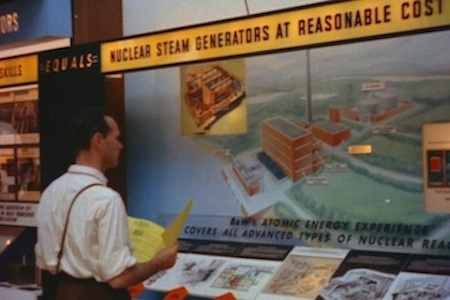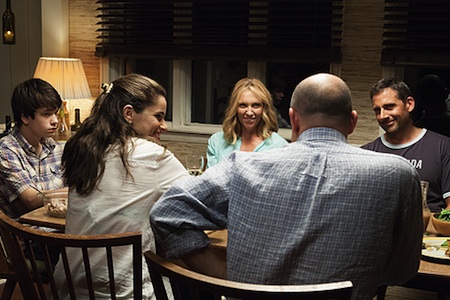[Editor’s note: The Sundance Film Festival closes today; its awards were announced last night. Here on Keyframe Daily, David Hudson’s rounded up what the critics are saying, as well as trailers of the winners.]
Six days into Sundance and the relentless glare of white snow gives way to dark thoughts. Such as: Is nuclear power the answer? And has Rob Corrdry lost his edge?
Let’s start with the facts. The film Pandora’s Promise intends to sway people to agree that nuclear power is the most viable source of alternative energy available today. It actually argues that nuclear power is the best type of energy period for the planet, and along the way it indirectly argues that a wholesale switch to nuclear has a chance to reverse the effects of carbon emissions in the world and by extension change the trajectory of climate change. It’s an incredibly attractive notion, as the concept of inevitability appears to pop up repeatedly in so many contexts, and Pandora’s Promise begins to offer a solution to our shared energy problems.
The preferable position of nuclear is averred by a number of thinkers including environmentalist Michael Shellenberger, journalist Gwyneth Cravens and activist Mark Lynas. But, for me at least, what really makes me take notice is hearing Stewart Brand (Whole Earth Catalogue, the WELL, Long Now…) state his position that nuclear power is the way to go. Each subject of the doc states that they have gone through an evolution on their thinking about nuclear power in the past decade or so. There’s a good deal of attractive evidence presented as well. Statements are made such as the meltdown at Chernobyl only accounts for 28 deaths, plus a handful in the years following. What? Chernobyl accounts for about 40 deaths? Or, the Fukushima meltdown does not appear to have any lasting repurcussions on human health. It also presents reactors themselves as very safe ventures. The film basically begs one to do research to see what’s real. But, unfortunately, just some basic searching on the issue brings up a number of downsides to nuclear energy production, including its cost, the time needed to run up to production and it sustainability. Pandora’s Promise is a fascinating view on energy, but it feels thin on truly investigating the issue fully and fat and telling people how wrong they are. What’s missing from the film is the inkling of any kind of downside to building and using nuclear reactors.
Speaking of potential meltdowns, I am a fan of Rob Corddry’s acting, but I am not sure if it’s just my own weird idiosyncracy. Corddry (also a correspondent on The Daily Show with Jon Stewart) is cast in two films that made their premieres here: In a World… and The Way, Way Back. I was introduced to him through his supporting role as Lou in Hot Tub Time Machine. In the film, he was suicidally depressed and relentlessly prickly. Perhaps, from my perspective, he performed that role too well, because it is difficult for me to view him in the new Sundance features where he plays two well meaning, and basically kind men without having the expectation and perception that at any moment he will prove to be a powder keg.
This could be read as a criticism, as in “He doesn’t seem really seem like the character he plays.” But, in fact, I am wondering if this reading of Corddry is just my weird take on him. Corddry is a magnetic character actor. His role in The Way, Way Back is far from the foreground. The film focuses on a young man trying to navigate the new territory of his mother’s boyfriend and his world as they stay in his summer home. Corddry plays a friend of the boyfriend, helping him to indulge in the summer beach culture as adult-children—smoking pot, drinking, staying out late and generally ignoring the kids. In comparison to others in the film, Corddry’s character is remarkably sweet, even diffusing a potential problem at one point.
In In a World… Corddry has a much larger, though still supporting, role. He plays Moe, the husband of the main character’s sister. The film centers on a conflict between a father and daughter who are attempting to make it in the world of voice over narration. It’s an funny and touching movie. Moe and his wife Dani, played by Michaela Watkins occupy the primary subplot of the film, which hinges on whether their relationship will last a moment of indiscretion. Corddry plays a doting homebody, the height of which is displayed when he offers to create a “sandwich bar” for dinner. In their relationship, he is wronged, and his reaction is unequivocally even keeled. But all the while, I expect Corddry to explode in anger and venomous spite. He doesn’t. He isn’t that guy in these films. Is anyone else always expecting Corddry to rip his face off and destroy the set? Does anyone else out there think someone should cast him to play a funny serial killer?
For more on Sundance 2013, please visit Keyframe Daily, which indexes Sundance coverage and awards.





